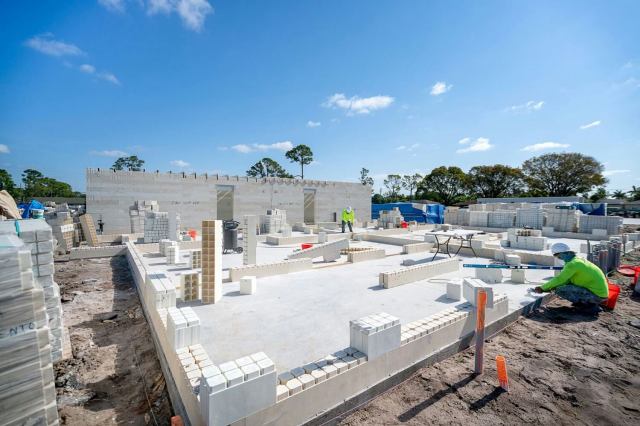A Miami-based company has developed a new type of construction that it says is 23 times stronger than concrete, protecting against intensifying hurricanes and other extreme weather events.
Renco USA uses a proprietary combination of recycled glass fibers, recycled plastic, resin, and stone to create Lego brick-like blocks that are then used to "design and build mineral composite fiber reinforced structures."
The company claims that this construction style is faster than traditional building methods and much stronger than concrete, with the ability to withstand the force of a Category 5 hurricane.
Now, those claims will be put to the test, as Renco USA just completed its first housing complex in Palm Springs, Florida.
"It's important to our residents to have a building that's going to be able to sustain them. So, they don't have to find housing, and we don't have to help them find housing when their residence or business has been destroyed. This is really important for the community," Palm Springs Mayor Bev Smith said.
As extreme weather events grow more frequent and more intense as a result of our reliance on dirty energy sources, the entire state of Florida is especially at risk from devastating hurricanes. This year, Hurricanes Ian and Idalia brought power outages, flooding, and destruction to Florida residents.


As a result, insurance rates in the Sunshine State have skyrocketed, with companies like Bankers Insurance, Centauri Insurance, Lexington Insurance, and Farmers Insurance even pulling out of the state entirely and refusing to offer policies to Floridians.
That means that constructing homes that are extremely resistant to wind damage is more important than ever, which is what Renco USA hopes it has done with its patented construction style.
"Since it's 100% recyclable, with a smaller carbon footprint and no jobsite waste, RENCO is greener and more sustainable than building with wood or concrete. And it will outlast any building system today, since it cannot rust or rot, termites can't eat it, mold won't grow on it and it's fire retardant," a rep for the company told BusinessWire.
Join our free newsletter for weekly updates on the coolest innovations improving our lives and saving our planet.









